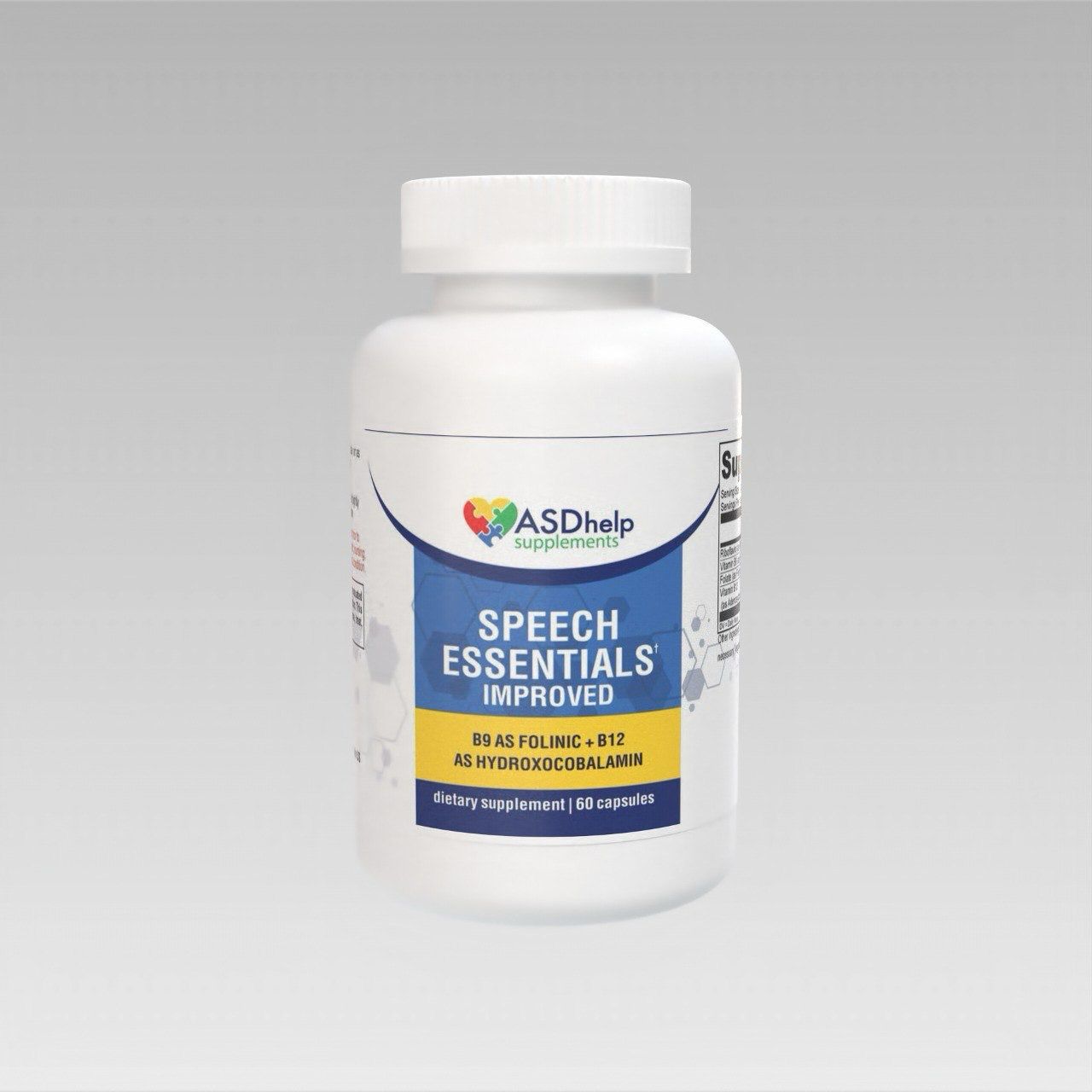

Health products and supplements are an affordable and effective way to ensure you and your loved ones are getting the daily recommended intake of essential vitamins, minerals and other important nutrients necessary for optimal health.
PREORDER Speech Essentials 60 capsules
The Importance of Folates
Discontinue medications that interfere with folate metabolism.
Start taking folinic acid in a dose of 1/5 capsule - 0.5 mg / kg per day, divided into two doses. If necessary, the dose can be increased to 1-4 mg per kg per day, divided into two doses (maximum 50 mg per day)- no more than 5 capsules per day
Eliminate folic acid supplements - synthetics
Introduce a dairy-free diet.
Observe changes in understanding and behavior.
Watch for (negative) side effects.
Folic acid (vitamin B9, also known as folate) is a water-soluble B vitamin that is essential for many physiological systems in the body. The name “folate” is derived from the Latin word folium, meaning “leaf,” highlighting that its primary natural source is leafy vegetables. However, in modern Western diets, fortified foods are the main source of folates.
Folic acid is the inactive, oxidized form of folate compounds. In the body, the primary active form of folates is 5-methyltetrahydrofolate (5-MTHF). Folic acid is converted into dihydrofolate (DHF) and then into tetrahydrofolate (THF) through the enzyme dihydrofolate reductase (DHFR). This reaction requires niacin (vitamin B3) and can be slowed by certain medications.
THF is converted into 5,10-methylene-THF, which is then further transformed into 5-MTHF by the enzyme methylenetetrahydrofolate reductase (MTHFR). Later, 5-MTHF is converted back into THF through methionine synthase, a process that depends on the presence of B12. During this reaction, 5-MTHF donates a methyl group to homocysteine, leading to the production of methionine and the regeneration of THF.
Folate is critical for the continuous synthesis of purine and pyrimidine nucleic acids, the molecules from which DNA and RNA are made. DNA stores the genetic code and must be replicated during cell division. Therefore, folates are crucial during periods of rapid cell reproduction, especially before birth, during the formation of the embryo and fetus, and in early childhood when cells grow rapidly.
The folate cycle interacts with the methionine cycle, and also plays a role in the production of tetrahydrobiopterin (BH4). Folate deficiency can disrupt these processes. The methionine cycle is necessary for DNA methylation, a process important for regulating gene expression. BH4 is essential for the production of nitric oxide, a substance critical for blood flow regulation and for the production of neurotransmitters such as dopamine, serotonin, and norepinephrine. In the production of these neurotransmitters and nitric oxide, tetrahydrobiopterin (BH4) is converted to dihydropterin (BH2), and for BH2 to be recycled back to BH4, 5-MTHF must be converted back to THF.
Several disorders are associated with folate deficiency. For example, as blood cells need constant replenishment, folate deficiency often leads to anemia, which is a shortage of red blood cells. Folate deficiency during pregnancy can lead to neural tube defects in the fetus, such as spina bifida.
Cerebral Folate Deficiency: A Recently Discovered Neurological Development Disorder
Ten years ago, Ramaekers and colleagues described a new neurodevelopmental disorder called cerebral folate deficiency (CFD). They reported five patients who developed normally until about 4-6 months of age, but during the second half of their first year, these patients experienced developmental regression and increasing neurological symptoms, including irritability, psychomotor delay, ataxia, dyskinesia, pyramidal disturbances, visual disturbances, and epilepsy. These patients also developed acquired microcephaly.
It was found that the level of 5-MTHF was normal in the serum and red blood cells, but reduced in the cerebrospinal fluid. This disorder was named CFD to emphasize the lack of folates in the central nervous system (CNS).
Cerebral Folate Transporters
To understand the nature of CFD, it is important to realize that the CNS is a protected area of the body. The blood-brain barrier (BBB) tightly regulates the entry of substances into the CNS. To pass through the BBB, the active form of folates, 5-MTHF, needs the assistance of one of two specialized transporters. The main transporter uses a specialized folate receptor called folate receptor 1 (FR1). 5-MTHF binds to FR1, and together they cross the BBB. On the basolateral side of the cell, 5-MTHF is released into the CNS, while FR1 returns to pick up another 5-MTHF molecule. This transport process requires energy in the form of adenosine-5-triphosphate (ATP).
The second transporter is the reduced folate carrier (RFC), which is less efficient at attracting 5-MTHF but has a higher affinity for 5-formyltetrahydrofolate, also known as folinic acid or leucovorin. RFC is also responsible for delivering 5-MTHF to neurons once it has crossed into the CNS.
Causes of Cerebral Folate Deficiency
Ramaekers’ group tested the gene encoding FR1 to determine whether a genetic mutation was responsible for the disruption of 5-MTHF transport into the CNS but did not find any mutations. However, in 2004, Ramaekers and Blau expanded their study group to 20 patients and again found no mutations in FR1. They discovered that patients’ FR1 receptors in the cerebrospinal fluid were non-functional, leading to the hypothesis that a certain type of molecule—presumably an autoantibody—irreversibly binds to FR1, impairing its ability to bind folates. In 2005, Ramaekers and colleagues found blocking autoantibodies against FR1 in the serum of 25 out of 28 children with CFD. These autoantibodies were not detected in the control group of children of the same age.
Cerebral Folate Deficiency and Autism Spectrum Disorders
Seven of the 20 children in the second CFD study group had autism spectrum disorders (ASD). Of the 28 patients with FR1 autoantibodies in the first study group, five had low-functioning autism with neurological manifestations. Subsequent research identified more cases of CFD in children with idiopathic autism (idiopathic meaning “of unknown cause”). Together, these findings suggest that early low-functioning autism with neurological disorders is characteristic of children with both autism and CFD.
Why Choose Us?
Our mission is to help you enjoy optimum health through proper nutrition! Good health is all about looking your best and having the energy and stamina to do the things you love. It's difficult to be productive and happy if you're sick or run down all the time. We believe strongly that certain supplements should be at the core of your health program.
We are committed to providing only high quality products. Many brands will never be sold in our stores due to concerns we have with their quality control or business practices.
About Us
BioHelp is a family owned and operated nutraceutical distribution company. BioHelp offers a wide range of professional only product lines, to everyone who's main goal is to achieve a better quality of life, and we take pride in our ability to educate our clients on product selection. We are your personal concierge to the nutraceutical world. With the growing awareness of food allergies, our staff is able to provide support on products that would best suit the best. Make sure your body is getting all the nutrition it needs to stay healthy and keep you strong. BioHelp will steer you in the right direction and ensure your supplements fit your goals and lifestyle.
